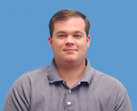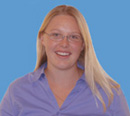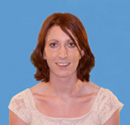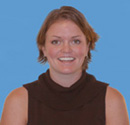|
One faculty member and four students are up for the task as they began classes last month in the UNMC College of Dentistry, Department of Dental Hygiene, West Division. Todd Junge feels he has prepared most of his life for the task as the primary faculty member of the program.
Junge was born in Gordon, Neb., and grew up in O’Neill, where he graduated from high school. He attended the University of Nebraska at Kearney and the University of Nebraska-Lincoln before entering into the dental hygiene program at UNMC. After graduation, he was employed in a private practice in Omaha. “I enjoy helping students develop the skills they need and enjoy watching them grow into professionals,” he said. “The program in Scottsbluff/Gering will provide valuable services to the community and surrounding areas. The students will receive a top-notch education and clinical education. Our students will be living public health/community service every day.”
The program’s four students are honored to be part of the expanded program. As a child, Sheri Printz of Sidney spent a lot of time at her father’s dental practice. “I thought it was fun and enjoyable,” she said. “We will have to work hard, but I’m really excited about the program.”
Heather Howell of Newcastle Wyo., became interested in dental hygiene while working for a dentist one summer. “He really encouraged me and gave me confidence to pursue a career in the dental field. I am so excited to just be accepted into the dental hygiene program at UNMC because it is such a prestigious school. I feel compelled to do my best so this program can expand to better serve the Panhandle and the surrounding areas,” Howell said.
“I like the fact that you can work and also have a family life,” said Kelsey Dorsey of Arcadia. “I am very excited to be in the program. It will be challenging, but rewarding in the end.”
|
The grant was awarded to the Panhandle Community Services of Gering, which subcontracts with the UNMC College of Dentistry in Lincoln to make its dental hygiene program accessible in western Nebraska. The first students began classes in August.
“We’re very excited about the partnership with the College of Dentistry for a variety of reasons,” said Margo Hartman, deputy director of PCS. “Access to dental care is a need throughout the Panhandle. This is an opportunity for those who want to become dental hygienists to live here and not have to move to Lincoln to go to school to become dental hygienists.”
PCS recently expanded its facilities and plans to have four dental patient care rooms where students will learn clinical hygiene skills with patients at PCS, a non-profit community-based organization that serves low-income and disadvantaged people, and those unable to meet their needs through other sources.
“We see this opportunity as positive economic development,” Hartman said. “And after graduation, students can find good paying jobs with which they can support themselves and their families. We serve children and adults in our community and surrounding areas who may not get dental care otherwise.”
The UNMC College of Dentistry’s dental hygiene program is a two-year, bachelor’s degree granting program. Students enter the program after they complete two years of undergraduate prerequisite courses.
Scottbluff/Gering students “attend” classes via distance learning at the PCS and share facilities and student services with nursing students at the UNMC College of Nursing West Nebraska Division in Scottsbluff. Dental hygiene students will perform clinical skills in the dental facilities at PCS.
Dental hygienists are licensed oral health professionals whose focus is preventing and treating oral diseases. Dental hygienists perform oral health care assessments; expose, process, and interpret dental X-rays; remove plaque and tartar; apply cavity-preventive agents such as fluorides and sealants; and teach proper oral hygiene.
George Schlothauer, D.D.S., a western Nebraska private practice dentist who serves on the PCS Health Committee, is looking forward to the partnership. “There is nothing but pluses for the establishment of the hygiene program here in Gering. Being in western Nebraska, so far from the college, it is especially hard to get young trained dental hygienists to return.
“Our hope is that if we train the students here, they more than likely will elect to stay here or locate nearby. As individuals like me get closer to retiring, there will be a great demand for both dentists and hygienists.”
The college has tried for a decade to increase the pool of students in the western part of the state, said John Reinhardt, D.D.S., dean of the UNMC College of Dentistry. “There is a big shortage of dental hygienists in Nebraska, west of Grand Island,” he said. “We are taking the program to the students in hopes that we can encourage them to graduate and practice in the shortage areas.”
Todd Junge, a graduate of the UNMC dental hygiene program, has been hired as a faculty member, said Gwen Hlava, chairwoman of the department of dental hygiene.
The Panhandle students will learn the same academic and clinical program as their colleagues, said David Brown, Ph.D., professor and executive associate dean, College of Dentistry. “The only difference will be in the classroom where students will see and communicate with faculty and fellow students in Lincoln in real time, live via satellite or Internet communications.”
Dr. Brown expects traditional, as well as non-traditional, students to enroll in the program. “The more hygienists we can have in underserved areas, the better,” he said. “In Nebraska, we have a problem of access to oral health care. There really is a health-care crisis in dentistry in the western part of the state.”
Drs. Reinhardt and Brown credit PCS with making the program possible in the local area.




